 When Union Minister Arun Jaitley last week tweeted that “ one of the reasons why our conviction rates are poor is that adventurism and megalomania overtakes our investigators and professionalism takes a back seat,” it was clear that all was not well with the investigations by the CBI into the ICICI Bank loan case where its CEO and MD, Chanda Kochhar and her husband Deepak Kochhar are involved. The federal investigation agency was looking into a possible quid pro quo where Kochhar may have favoured Videocon, which had an investment in a firm promoted by her husband Deepak Kochhar. She initially denied there was any conflict of interest, and the bank’s board backed her at first, but Chanda Kochhar had to quit the ICICI Bank in October 2018 as pressure mounted on her to leave and allow independent investigations.
When Union Minister Arun Jaitley last week tweeted that “ one of the reasons why our conviction rates are poor is that adventurism and megalomania overtakes our investigators and professionalism takes a back seat,” it was clear that all was not well with the investigations by the CBI into the ICICI Bank loan case where its CEO and MD, Chanda Kochhar and her husband Deepak Kochhar are involved. The federal investigation agency was looking into a possible quid pro quo where Kochhar may have favoured Videocon, which had an investment in a firm promoted by her husband Deepak Kochhar. She initially denied there was any conflict of interest, and the bank’s board backed her at first, but Chanda Kochhar had to quit the ICICI Bank in October 2018 as pressure mounted on her to leave and allow independent investigations.
Jaitley’s advice to the investigating agency to avoid “adventurism” and concentrate only on the bull’s eye, meant a lot. Keeping in view that he is convalescing because of illness, it was clear that it was a very serious matter.
Tehelka had done a couple of stories when the news broke out that Chanda Kochhar and her husband Deepak Kochhar were cahoots with Videocon group chief, Venugopal Dhoot. Ironically, however, the premier investigation agency had already almost decided to close the case against the three prime accused and others. The CBI is already under the suspicion of radar with its former chief and his deputy accusing each other of corruption. Sources revealed that deputy inspector general Jasbir Singh and Superintendent of Police Sudhanshu Mishra, who were part of the investigation, had almost agreed on the recommendation made by investigating officer DJ Bajpei in December last year that there was limited evidence against the Kochhars. The CBI is also conducting an internal inquiry into the suspected role of Superintendent of Police Sudhanshu Dhar Mishra in the alleged delay in probing the high profile case. Sources disclosed that there was a strong suspicion that he might leak information about the ensuing searches.
The acting CBI director M Nageswara Rao has reversed the initial recommendation and ordered filing a first information report (FIR) in the 3,250-crore Videocon loan case. The CBI sleuths have also recommended that the role of other senior ICICI Bank officials, Sandeep Bakshi, K Ramkumar, Sonjoy Chatterjee, Zarin Daruwala, Rajiv Sabharwal, KV Kamath and Homi Khusrokhan, be looked into. The names include those of some of the bank’s directors (including non-executive directors). Some of the names are of people who were on the bank’s credit committee, which signed off on the 3,250 crore loan to Videocon in 2012.
Daruwala has left the bank and is now the CEO of Standard Chartered Bank’s Indian operations. Kamath is now head of the BRICS bank. Chatterjee too has left the bank and is the CEO of Goldman Sachs India. Khusrokhan is an independent director on the board of the bank. Sabharwal has also left the bank and is now the CEO of Tata Capital. Bakshi took over as CEO and MD of the bank after Chanda Kochhar resigned.
Subsequently, the CBI registered a case of criminal conspiracy and fraud against Chanda Kochhar, her husband Deepak Kochhar, and Videocon Group head Venugopal Dhoot on January 22, 2019. The FIR has been registered 13 months after it started an investigation into alleged irregularities in loans sanctioned to the Videocon Group companies during the period 2009 to 2012 in alleged violation of rules, causing a loss of 1,730 crore to the bank. The total loan sanctioned was 3250 crore. The FIR, registered under the Prevention of Corruption Act, was based on a Preliminary Inquiry by the CBI in December 2017.
As per preliminary inquiry, six high-value loans were sanctioned to various companies under the Videocon Group from June 2009 to October 2011. The modus operandi was that a loan was sanctioned to Videocon Industries for refinancing its existing loans. The credit limits in question were sanctioned after Chanda Kochhar took charge of ICICI Bank as MD and CEO in May 2009. As on April 26, 2012, the outstanding against six loan accounts were adjusted as another term loan of 1,730 crore sanctioned under refinance of domestic debt. As per the plan to defraud, the account of Videocon and its group companies were declared non-performing assets in June 2017.
The CBI has conducted searches at four locations in Mumbai and Aurangabad, including the offices of Videocon Group, Nupower Renewables Limited (NRL) and Supreme Energy Private Limited (SEPL). The FIR was filed after CBI said its preliminary enquiry found enough evidence of a quid pro quo. According to FIR as a part of quid pro quo, VN Dhoot made an investment of Rs 64 crore in Nupower Renewables Ltd (NRL) through Supreme Energy Private Limited (SEPL) and also transferred SEPL to Pinnacle Energy Trust managed by Deepak Kochhar through a circuitous route between 2010 and 2012.
Among those named in the FIR are Deepak Kochhar’s company NRL, Videocon International Electronics Limited (VIEL), Videocon Industries Limited (VIL) and SEPL. Sources said that the role of K.V. Kamath, currently the bank’s non-executive chairman, Sandeep Bakshi, who replaced Chanda Kochhar may also be investigated.
According to the FIR, NRL was incorporated in December 2008 and Deepak Kochhar, Venugopal Dhoot and one Saurabh Dhoot were its directors. The Dhoots resigned in January 2009, further strengthening the suspicion that the amount transferred in Kochhar’s company was meant only for Kochhar. Dhoot resigned as a director in January 2009 and transferred the company’s control to Deepak Kochhar by offloading his shares in favour of Pinnacle
Energy Trust.
According to FIR this was “illegal gratification/undue benefit” given by Dhoot to Kochhars. The transfer of 1,997,500 warrants to Deepak Kochhar at the rate of 10 per warrant on an initial payment of Re 1 per warrant by Venugopal Dhoot to Kochhar were clearly a part of gratification for favours. On June 5, 2009, an equal amount of shares of NRL held by VN Dhoot and Deepak Kochhar was transferred to SEPL, which then became 95 per cent shareholder of NRL. All this proved quid pro quo and proved to be last nail in the coffin of Kochhars.
letters@tehelka.com












